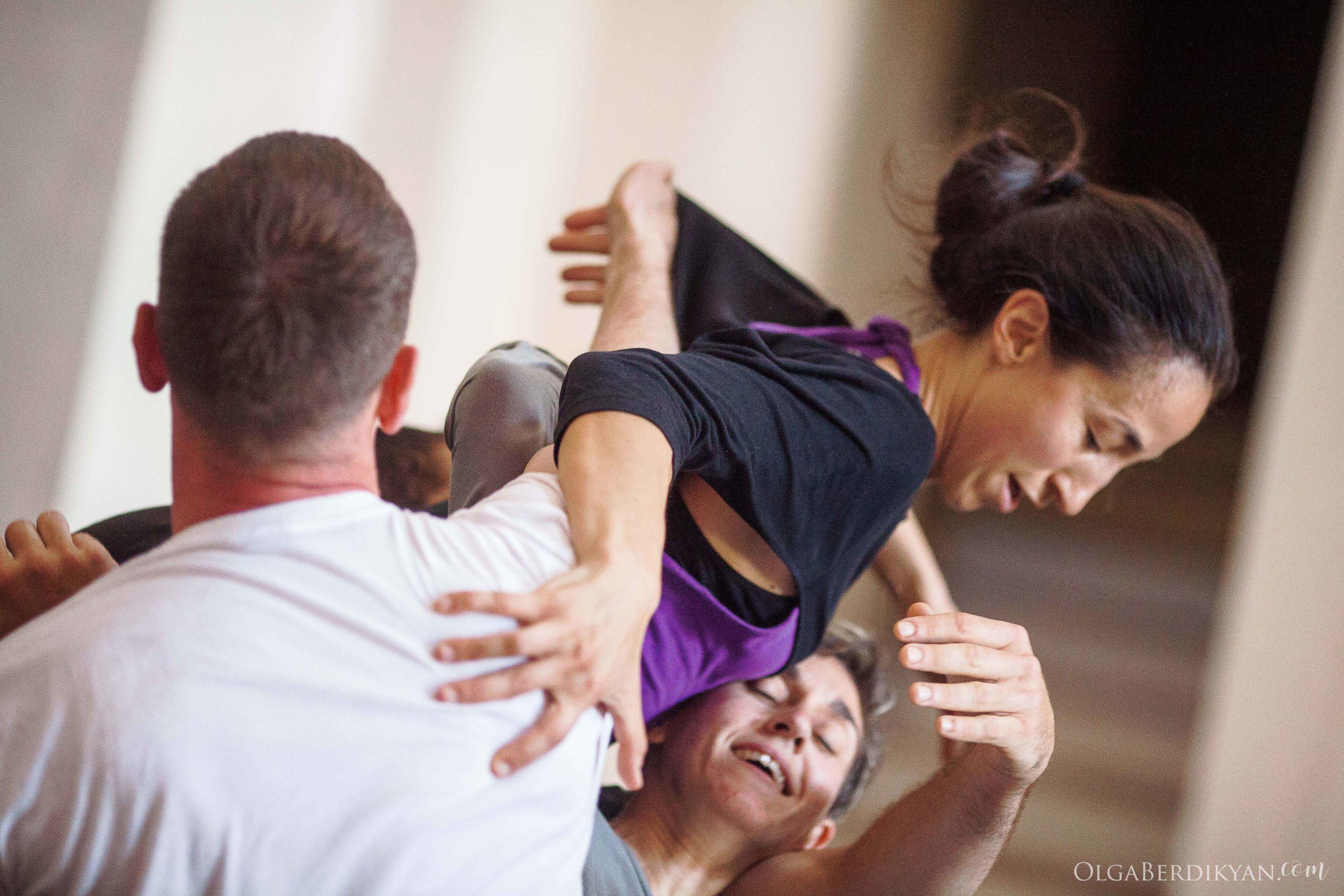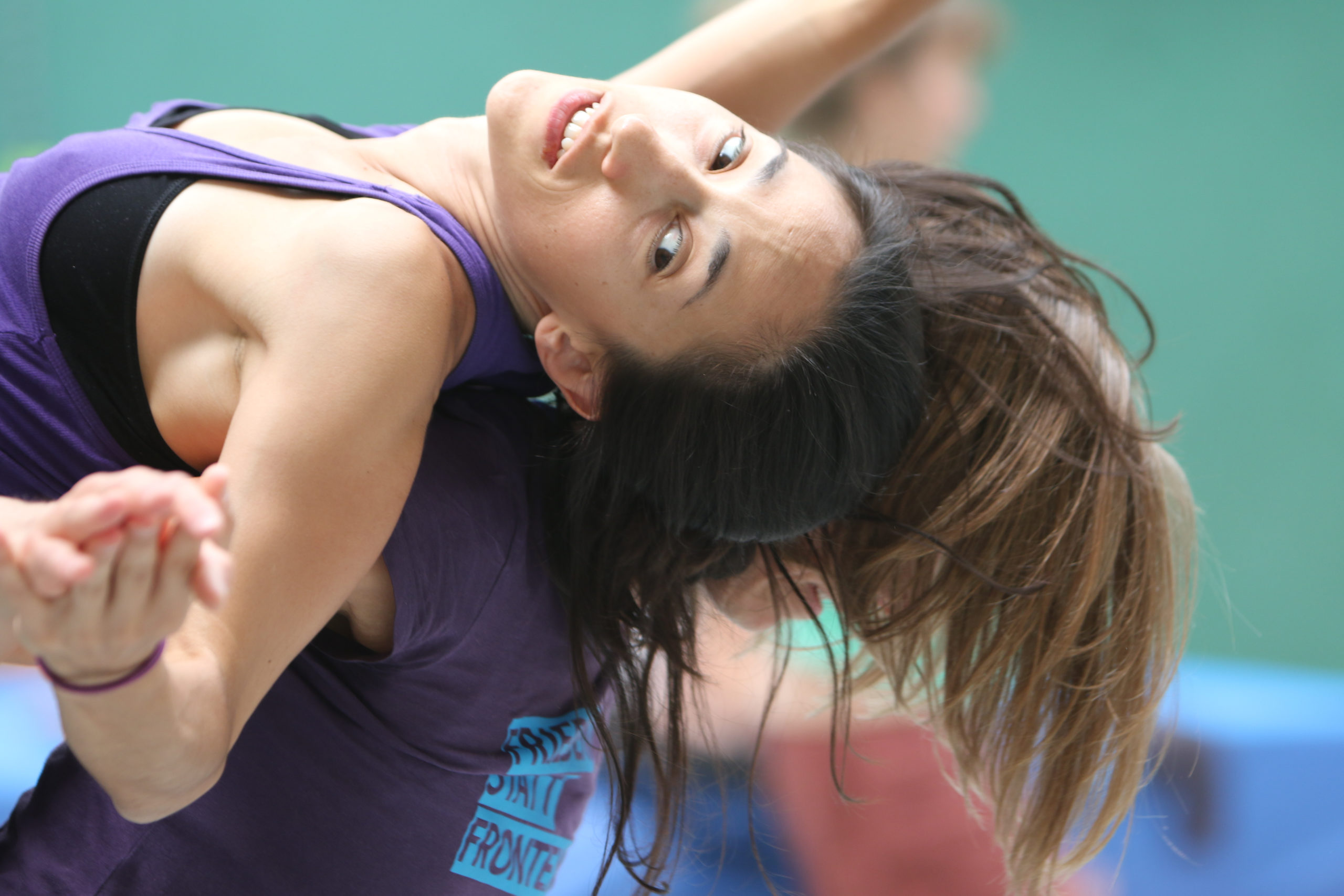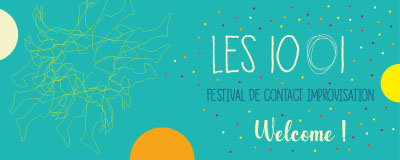Workshop : Weaving the trio – En tissant le trio

In french below
Improvising as a trio offers us a host of possibilities, although it does involve a certain challenge. Perhaps the main challenge is to get rid of the duo as the archetypal CI dance, and try to think of ourselves as a trio.
It’s common to feel disoriented in this configuration, as we lose a reference that was often integrated before: that of “I’m dancing with someone”. Dancing with more than one person can be confusing.
If we set roles, sooner or later our actions-movements become automated, as do our responses or reactions to the various stimuli of improv. The flow of our communication is cut off when the reciprocal connection that is essential to CI is lost. Dancing as a duo tends precisely to distribute roles.
For example, we often divide ourselves into separate physical and relational actions or functions (e.g. between who does the base and who flies). If this division structures our dance dialogue, it’s obvious that we’re diminishing our potential. In trio, this binary distribution cannot be sustained, so we need to inhabit more options: improv is decoded.
In these classes, we’ll be working on the possible points of view (or roles) of the trio.
How can I take pleasure without ceasing to be available? How can I be as present to myself as to the bodies I’m dancing with? We’ll explore distribution and multiplication, (dis)balancing our focus, weight, space, intention, communication (…), to create various shifting structures, in order to establish and sustain a polyphonic, co-creative relationship.
***
Improviser en trio nous offre moult possibilités bien que cela implique un certain challenge. L’enjeu principal serait peut-être de se défaire du duo comme archétype de la danse en CI, et tenter de nous penser à trois.
Il est commun de se sentir désorientée dans cette configuration, car nous y perdons une référence souvent intégrée auparavant : celle du « je danse avec quelqu’un.e ». Danser avec plus qu’une personne peut donc amener confusion.
Si nous fixons des rôles, alors nos actions-mouvements s’automatisent tôt ou tard, ainsi que nos réponses ou réactions aux différents stimuli de l’impro. Le flux de notre communication est coupé lorsque la connexion de réciprocité se perd, elle est indispensable au CI. L’option de danser en duo tend justement à distribuer des rôles.
Par exemple, nous nous divisons souvent entre actions ou fonctions physiques et relationnelles séparées (exemple : entre qui fait la base et qui vole). Si cette division structure le dialogue de notre danse, il devient évident que nous diminuons nos potentiels. En trio, cette distribution binaire ne peut se soutenir et nous devons donc habiter davantage d’options : l’impro se voit décodifiée.
Dans ces classes, nous travaillerons les possibles points de vue (ou rôles) du trio.
Comment prendre du plaisir sans cesser d’être disponible ? Comment être autant présente à moi-même qu’aux corps avec qui je danse ? Nous explorerons la répartition et la multiplication, (des)équilibrant nos focus, poids, espace, intention, communication (…), pour créer diverses structures mouvantes, afin d’établir et pouvoir soutenir une relation polyphonique et co-créative.
Intervenante : Natividad Insua

Queer, immigrant, Latina, among other facets. A CI activist, she has been involved in this practice for 19 years and is passionate about its transmission as well as pedagogy in general. Her relationship with movement began in childhood, with the Martial Arts: Taekwondo and Aikido, which she continues to train today.
Trained in the Performing Arts in Argentina, she completes and deepens her body techniques through somatic and holistic practices (Yoga, BMC, Reiki, Axis Syllabus). Since 2008, Nativ has taught CI in regular classes, intensive workshops and international festivals in Argentina, Spain (Madrid festival “la Xè”, Tenerife and Cardedeu/Catalonia), France, Italy (Italy Contact Fest), Germany (Freiburg “la XXè”) and Ukraine (CI & snow). In 2012, following the birth of her daughter, she created and developed the “Contact en famille” project (integrating motor diversity to dance together as adults and children). In 2014, she created the Contact Improvisation studio ENEstudio in Barcelona and has been running it ever since. In 2016, she launched an online project to gather as much information as possible about CI in the Spanish language: “Archivo CI”, this digital space aims to make theoretical and historical knowledge around our practice accessible to Spanish-speaking speakers.That same year, Nativ embarked on an investigation that she is still exploring today: how to use the technical and relational aspects of Aikido for the benefit of CI?
Thanks to ENEstudio, Natividad opens up the spaces for teaching, creation, reflection and solidarity that are essential to its coherence within the CI community.
***
Personne Queer, immigrée, latina, entre autres facettes. Activiste du CI, engagée dans cette pratique depuis 19 ans et passionnée par sa transmission ainsi que la pédagogie en général. Sa relation avec le mouvement avait commencé dès l’enfance, par les Arts Martiaux : Taekwondo et Aïkido dont elle poursuit encore l’entrainement aujourd’hui.
Formées aux Arts de la scène en Argentine, elle complète et approfondit ses techniques corporelles par des pratiques somatiques ou holistiques (Yoga, BMC, Reiki, Axis Syllabus). Depuis 2008, Nativ a enseigné le CI dans le cadre de classes régulières, ateliers intensifs et festivals internationaux en Argentine, Espagne (festival Madrid « la Xè », Tenerife et Cardedeu/Catalogne), France, Italie (Italy Contact Fest), Allemagne (Freiburg « la XXè ») et Ukraine (CI & snow). En 2012, à la naissance de sa fille, elle crée et développe le projet « Contact en famille » (intégration des diversités motrices pour danser ensemble adulte-enfant). En 2014, elle crée le studio de Contact Improvisation ENEstudio à Barcelone et le dirige depuis. En 2016, elle lance un projet en ligne pour réunir un maximum d’informations sur le CI en langue espagnole : « Archivo CI », cet espace digital a pour but de rendre accessible le savoir théorique et historique autour de notre pratique, pour les locuteurices hispanophones. Cette même année, Nativ entre dans une investigation qu’elle explore encore aujourd’hui : Comment utiliser les aspects techniques et relationnels de l’Aïkido au bénéfice du CI ?
Natividad ouvre, grâce à ENEstudio, les espaces de pédagogie, de création, de réflexion et de solidarité indispensables à sa cohérence dans la communauté CI.
